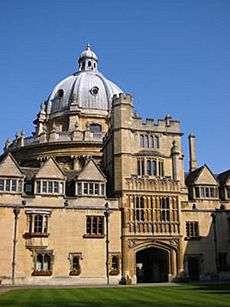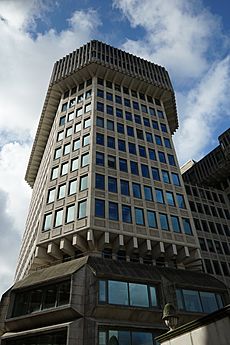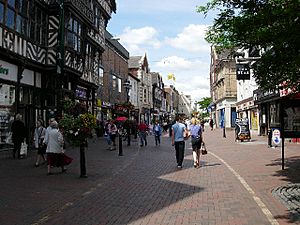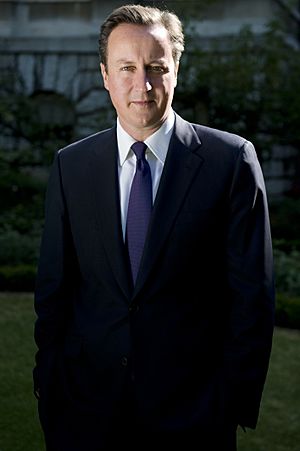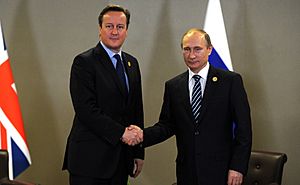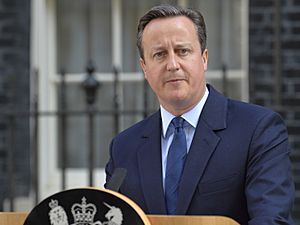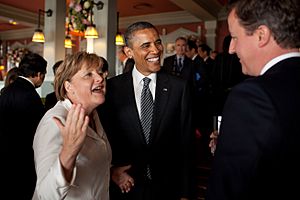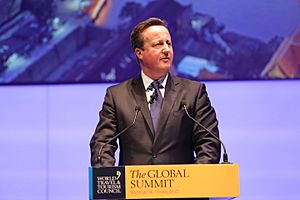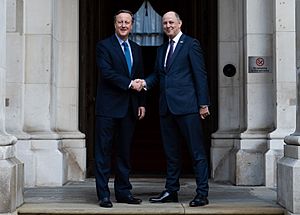David Cameron facts for kids
Quick facts for kids
The Lord Cameron of Chipping Norton
|
|||||||||||||||||||
|---|---|---|---|---|---|---|---|---|---|---|---|---|---|---|---|---|---|---|---|
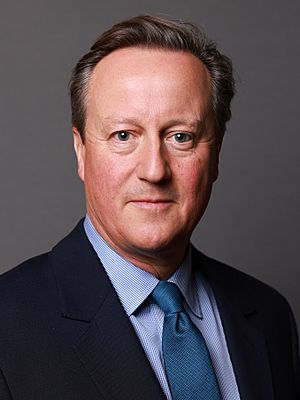
Official portrait, 2023
|
|||||||||||||||||||
| Secretary of State for Foreign, Commonwealth and Development Affairs | |||||||||||||||||||
| Assumed office 13 November 2023 |
|||||||||||||||||||
| Prime Minister | Rishi Sunak | ||||||||||||||||||
| Deputy | Andrew Mitchell (since 2024) | ||||||||||||||||||
| Preceded by | James Cleverly | ||||||||||||||||||
| Prime Minister of the United Kingdom | |||||||||||||||||||
| In office 11 May 2010 – 13 July 2016 |
|||||||||||||||||||
| Monarch | Elizabeth II | ||||||||||||||||||
| Deputy | Nick Clegg (2010–2015) | ||||||||||||||||||
| First Secretary | |||||||||||||||||||
| Preceded by | Gordon Brown | ||||||||||||||||||
| Succeeded by | Theresa May | ||||||||||||||||||
| Leader of the Opposition | |||||||||||||||||||
| In office 6 December 2005 – 11 May 2010 |
|||||||||||||||||||
| Monarch | Elizabeth II | ||||||||||||||||||
| Prime Minister |
|
||||||||||||||||||
| Deputy | William Hague | ||||||||||||||||||
| Preceded by | Michael Howard | ||||||||||||||||||
| Succeeded by | Harriet Harman | ||||||||||||||||||
| Leader of the Conservative Party | |||||||||||||||||||
| In office 6 December 2005 – 11 July 2016 |
|||||||||||||||||||
| Preceded by | Michael Howard | ||||||||||||||||||
| Succeeded by | Theresa May | ||||||||||||||||||
|
|||||||||||||||||||
|
|||||||||||||||||||
| Personal details | |||||||||||||||||||
| Born |
David William Donald Cameron
9 October 1966 Marylebone, London, England |
||||||||||||||||||
| Political party | Conservative | ||||||||||||||||||
| Spouse |
Samantha Sheffield
(m. 1996) |
||||||||||||||||||
| Children | 4 | ||||||||||||||||||
| Relatives | Cameron family | ||||||||||||||||||
| Education | |||||||||||||||||||
| Signature | |||||||||||||||||||
David William Donald Cameron, Baron Cameron of Chipping Norton, PC (born 9 October 1966) is a British politician who has served as Foreign Secretary since 2023. He previously served as Prime Minister of the United Kingdom from 2010 to 2016.
Early life and education
David William Donald Cameron was born on 9 October 1966 in Marylebone, London, and raised at Peasemore in Berkshire. He is the younger son of Ian Donald Cameron (1932–2010) a stockbroker, and his wife Mary Fleur, a retired Justice of the Peace. He has two sisters and an elder brother, Alexander Cameron.
Cameron was educated at two private schools. From the age of seven, he was taught at Heatherdown School in Winkfield, Berkshire. At the age of 13, he went on to Eton College in Berkshire, following his father and elder brother. His early interest was in art.
After leaving Eton in 1984, Cameron started a nine-month gap year.
In October 1985, Cameron began his Bachelor of Arts course in Philosophy, Politics and Economics (PPE) at Brasenose College, Oxford. His tutor, Vernon Bogdanor, has described him as "one of the ablest" students he has taught. Cameron graduated in 1988 with a first-class honours BA degree (later promoted to an MA by seniority).
Political career
After graduation, Cameron worked for the Conservative Research Department between September 1988 and 1993.
In July 1994, Cameron worked as the Director of Corporate Affairs at Carlton Communications. Carlton, which had won the ITV franchise for London weekdays in 1991, was a growing media company which also had film-distribution and video-producing arms. He resigned in February 2001 in order to run for Parliament.
Upon his election to Parliament, Cameron served as a member of the Commons Home Affairs Select Committee, a prominent appointment for a newly elected MP.
In June 2003, Cameron was appointed a shadow minister in the Privy Council Office as a deputy to Eric Forth, then Shadow Leader of the House. He also became a vice-chairman of the Conservative Party when Michael Howard took over the leadership in November of that year. He was appointed Opposition frontbench local government spokesman in 2004, before being promoted to the Shadow Cabinet that June as head of policy co-ordination. Later, he became Shadow Education Secretary in the post-election reshuffle.
From 2005 to 2016, Cameron served as Leader of the Conservative Party.
Prime minister (2010–2016)
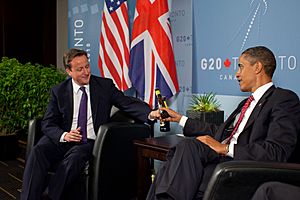
On 11 May 2010, following the resignation of Gordon Brown as prime minister and on his recommendation, Queen Elizabeth II invited Cameron to form a new administration. At age 43, Cameron became the youngest prime minister since Lord Liverpool in 1812, beating the record previously set by Tony Blair in May 1997. In his first address outside 10 Downing Street, he announced his intention to form a coalition government. Cameron outlined how he intended to "put aside party differences and work hard for the common good and for the national interest."
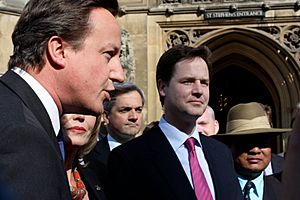
In response to the Great Recession, Cameron undertook the austerity programme. This was a deficit reduction programme consisting of sustained reductions in public spending, intended to reduce the government budget deficit and the welfare state in the United Kingdom. By 2015, the deficit as a percentage of GDP had been reduced to half what it was in 2010.
NATO military intervention in Libya
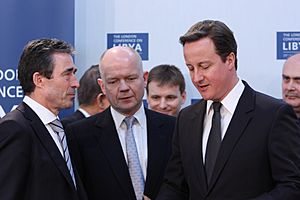
Cameron condemned the violence used against anti-Gaddafi protesters at the beginning of the Libyan Civil War. On 17 March 2011 the United Nations Security Council approved a no-fly zone to prevent government forces loyal to Muammar Gaddafi from carrying out air attacks on anti-Gaddafi rebels. Two days later the UK and the United States fired more than 110 Tomahawk missiles at targets in Libya.
Cameron said he was "proud" of the role United Kingdom played in the overthrow of Gaddafi's government.
By mid-2011 the initial limited intervention to protect Libyan civilians had become a policy of regime change. However that new policy did not include proper support and for a new government, leading to a political and economic collapse in Libya and the growth of ISIL in North Africa. It concluded that Cameron was ultimately responsible for this British policy failure.
Falklands
In 2013, in response to Argentina's calls for negotiations over the Falkland Islands' sovereignty, a referendum was called asking Falkland Islanders whether they supported the continuation of their status as an Overseas Territory of the United Kingdom. With a turnout of 91.94%, an overwhelming 99.8% voted to remain a British territory with only three votes against.
In light of this, Cameron said: "We believe in the Falkland islanders' right to self-determination. They had a referendum. They couldn't have been more clear about wanting to remain with our country and we should protect and defend them".
Military intervention in Iraq and Syria
In August 2013, Cameron lost a motion in favour of bombing Syrian armed forces in response to the Ghouta chemical attack, becoming the first prime minister to suffer such a foreign-policy defeat since 1782. In September 2014, MPs passed a motion in favour of British planes joining, at the request of the Iraqi government, a bombing campaign against Islamic State (IS) targets in Iraq; the motion explicitly expressed parliament's disapproval of UK military action in Syria. Cameron promised that, before expanding UK air strikes and ground support to include IS units in Syria, he would seek parliamentary approval.
In July 2015, a Freedom of Information (FOI) request by Reprieve revealed that, without the knowledge of UK parliamentarians, RAF pilots had, in fact, been bombing targets in Syria, and that Cameron knew of this. The prime minister, along with Defence Secretary Michael Fallon, faced strong criticism.
Following the terrorist attacks on Paris in November 2015, for which Islamic State claimed responsibility, Cameron began pushing for a strategy for the Royal Air Force to bomb Syria in retaliation. Cameron set out his case for military intervention to Parliament on 26 November, telling MPs that it was the only way to guarantee Britain's safety and would be part of a "comprehensive" strategy to defeat IS. On 3 December 2015 MPs voted 397–223 in favour of launching air strikes against ISIL targets in Syria. The vote for military action was supported by all but seven members of the Parliamentary Conservative Party, as well as 66 Labour MPs.
2016 referendum and resignation
As promised in the election manifesto, Cameron set a date for a referendum on whether the UK should remain a member of the European Union, and announced that he would be campaigning for Britain to remain within a "reformed EU". The terms of the UK's membership of the EU were re-negotiated, with agreement reached in February 2016. The option to leave came to be known as Brexit (a portmanteau of "British" and "exit").
The referendum was held on 23 June 2016. The result was approximately 52% in favour of leaving the European Union and 48% against, with a turnout of 72%. On 24 June, a few hours after the results became known, Cameron announced that he would resign the office of prime minister by the start of the Conservative Party Conference in October 2016. In a speech the next day outside 10 Downing Street, he stated that, on account of his own advocacy on behalf of remaining in the EU, "I do not think it would be right for me to try to be the captain that steers our country to its next destination." His farewell speech as he left No 10 accompanied by his family stressed the value of selfless public service.
Cameron originally stated that he would continue inside Parliament, on the Conservative backbenches. On 12 September, however, he announced that he was resigning his seat with immediate effect, and was appointed to the Manor of Northstead.
Political views and image
Poverty
In 2006 Cameron described poverty as a "moral disgrace" and promised to tackle relative poverty. In 2007 Cameron promised, "We can make British poverty history, and we will make British poverty history". Also in 2007 he stated "Ending child poverty is central to improving child well-being". In 2015, Polly Toynbee questioned Cameron's commitment to tackling poverty, contrasting his earlier statements agreeing that "poverty is relative" with proposals to change the government's poverty measure, and saying that cuts in child tax credits would increase child poverty among low-paid working families. Cameron denied that austerity had contributed to the 2011 England riots, instead blaming street gangs and opportunistic looters.
Marriage and family values
In 2009 Cameron said "the restoration of family values and a new commitment to economic and social responsibility" were "key to repairing 'broken Britain'". In 2013 Cameron described himself as "a marriage man, I am a great supporter of marriage. I want to promote marriage, defend marriage, encourage marriage."
Post-premiership (2016–2023)
On 19 June 2023, Cameron gave evidence to the UK Covid-19 Inquiry.
Positions
In October 2016, Cameron became chairman of the National Citizen Service Patrons. In January 2017, he was appointed president of Alzheimer's Research UK to address misconceptions surrounding dementia and campaign for medical research funding to tackle the condition.
All appointments post-premiership have to be approved by the UK government's Advisory Committee on Business Appointments. In addition to the two posts above they also approved the following positions:
- Consultant for Illumina Inc.
- Vice-chair, UK China Fund
- Director, ONE
- Consultant for First Data Corp.
- Member of Council on Foreign Relations
- Chairman, LSE-Oxford Commission on Growth in Fragile States
- Registered member of Washington Speakers Bureau
- Chairman of advisory board, Afiniti
Foreign Secretary (2023–present)
On 13 November 2023, there was a cabinet reshuffle in which former Home Secretary Suella Braverman was dismissed and replaced by former Foreign Secretary James Cleverly. Cameron replaced Cleverly as Foreign Secretary. In addition to his role, a life peerage will be conferred upon Cameron, making him a member of the House of Lords and the first Prime Minister to receive a peerage since Margaret Thatcher. This was the first time since 1970 that a former Prime Minister had been appointed to a ministerial post, when Alec Douglas-Home had been appointed by Edward Heath to serve as foreign secretary.
Memoir
On 19 September 2019, Cameron published a memoir, For the Record, through HarperCollins. He was reported to have signed an £800,000 contract for the book. According to the Guardian, the book was initially scheduled for 2018, but was delayed so Cameron would not be perceived as a "backstreet driver" in the ongoing Brexit negotiations.
Personal life
Family
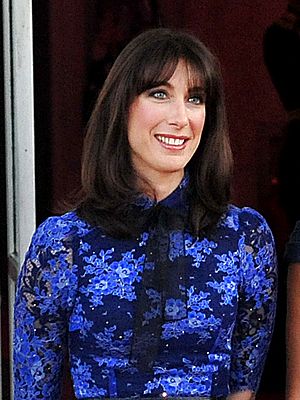
Cameron is married to Samantha Cameron (née Sheffield), the daughter of Sir Reginald Sheffield, 8th Baronet, and Annabel Lucy Veronica Jones (later Viscountess Astor). A Marlborough College school friend of Cameron's sister Clare, Samantha accepted Clare's invitation to accompany the Cameron family on holiday in Tuscany, Italy, after graduating from Bristol School of Creative Arts. It was then David and Samantha's romance started. They were married in 1996.
The Camerons have had four children. Their first, Ivan Reginald Ian, was born on 8 April 2002 in Hammersmith and Fulham, London, with a rare combination of cerebral palsy and a form of severe epilepsy called Ohtahara syndrome, requiring round-the-clock care. Recalling the receipt of this news, Cameron was quoted as saying: "The news hits you like a freight train ... You are depressed for a while because you are grieving for the difference between your hopes and the reality. But then you get over that, because he's wonderful." Ivan was cared for at the specialist NHS Cheyne Day Centre in West London, which closed shortly after he left it. Ivan died at St Mary's Hospital, Paddington, London, on 25 February 2009, aged six.
The Camerons have two daughters, Nancy Gwen (born 2004) and Florence Rose Endellion (born 2010), and a son, Arthur Elwen (born 2006). Cameron took paternity leave when Arthur was born, and this decision received broad coverage. It was also stated that Cameron would be taking paternity leave after his second daughter was born. She was born at the Royal Cornwall Hospital on 24 August 2010, three weeks prematurely, while the family was on holiday in Cornwall. Her third given name, Endellion, is taken from the village of St Endellion near where the Camerons were holidaying.
In early May 2008, the Camerons decided to enrol their daughter Nancy at a state primary school. For three years before that, they had been attending its associated church, St Mary Abbots, near the Cameron family home in North Kensington. Cameron's constituency home is in Dean, Oxfordshire, and the Camerons have been described as key members of the Chipping Norton set.
On 8 September 2010, it was announced that Cameron would miss Prime Minister's Questions in order to fly to southern France to see his father, Ian Cameron, who had had a stroke with coronary complications. Later that day, his father died. On 17 September 2010, Cameron attended a private ceremony for the funeral of his father in Berkshire, which prevented him from hearing the address of Pope Benedict XVI in Westminster Hall, an occasion he would otherwise have attended.
Leisure
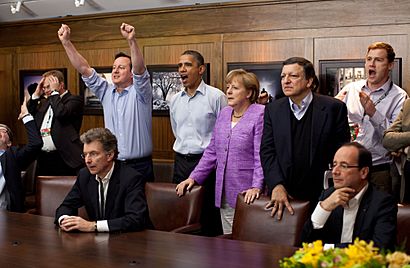
Before becoming prime minister, Cameron regularly used his bicycle to commute to work. In early 2006, he was photographed cycling to work, followed by his driver in a car carrying his belongings. His Conservative Party spokesperson subsequently said that this was a regular arrangement for Cameron at the time. Cameron is an occasional jogger and in 2009 raised funds for charities by taking part in the Oxford 5K and the Great Brook Run.
Cameron supports Aston Villa. He is also a keen cricket fan and has appeared on Test Match Special.
Faith
Cameron is a practising Christian and an active member of the Church of England.
Honours and awards
 United Kingdom:
United Kingdom:
- 14 December 2005: appointed to the Privy Council of the United Kingdom, giving him the honorific "The Right Honourable" for life.
- 13 November 2023: appointed a Life Peer to take up position in cabinet.
 Saudi Arabia:
Saudi Arabia:
As a former Prime Minister, Cameron, with his wife Samantha, had a place of honour at the state funeral of Queen Elizabeth II on 19 September 2022 and the Coronation of King Charles III and Queen Camilla on 6 May 2023.
See also
 In Spanish: David Cameron para niños
In Spanish: David Cameron para niños
- 2016 Prime Minister's Resignation Honours
- Muscular liberalism
Images for kids
-
David Cameron campaigning in the 2006 local elections at Newcastle upon Tyne on the Gateshead Millennium Bridge
-
Cameron being interviewed at the headquarters of Oxfam in 2006
-
With Theresa May, who was a member of the Shadow Cabinet from 1999 until 2010
-
Visiting British troops in Afghanistan, October 2014
-
With his predecessors Gordon Brown, Tony Blair, John Major and Deputy PM Nick Clegg, during Barack Obama's address in Westminster Hall, June 2011
-
With Israeli Prime Minister Benjamin Netanyahu in Jerusalem, Israel, January 2024


